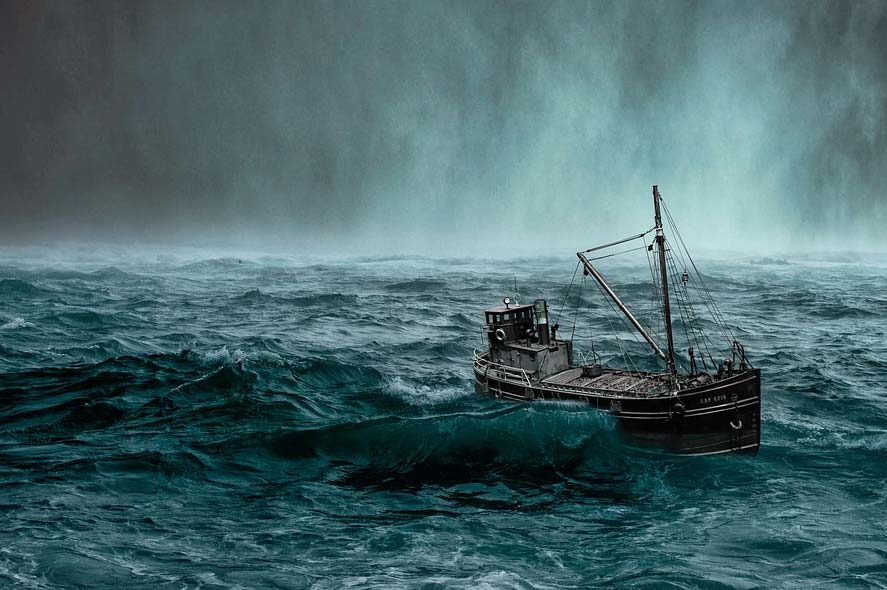Necessity cannot justify murder under English law. This case set a clear legal boundary by emphasising the absolute sanctity of human life, influencing courts worldwide and becoming a fundamental reference in discussions about morality and criminal responsibility.
In May 1884, the yacht Mignonette set sail from England bound for Australia, carrying four crew members: Captain Thomas Dudley, First Mate Edwin Stephens, seaman Edmund Brooks, and a 17-year-old cabin boy named Richard Parker. On July 5, disaster struck as the vessel was severely damaged by a wave, ultimately sinking approximately 1,600 miles from the Cape of Good Hope. The crew managed to board a small lifeboat, but their provisions were meagre—only two tins of turnips and no fresh water.
Over the following days, the stranded crew endured extreme hardship. Initially, they survived on their sparse supplies, eventually catching a turtle, which provided temporary relief. By July 17, however, they found themselves completely without food or water. In desperation, they began drinking their own urine, and Parker, against advice, consumed seawater, which severely worsened his condition. By July 24, Parker was gravely ill and slipped into a coma.
At this critical juncture, Captain Dudley proposed a harrowing solution to their plight: to sacrifice one crew member in order to provide sustenance for the others. Dudley suggested drawing lots, considering this a fair method for choosing who should be sacrificed. Stephens agreed in principle, but Brooks refused outright, and no lots were ever drawn. Eventually, Dudley and Stephens decided—without the participation or consent of Brooks—that Parker, already the weakest and near death, should be killed to save the remaining crew members.
On July 25, Dudley carried out this grim decision, stabbing Parker in the throat with a penknife. Parker’s body provided essential nourishment, including his liver, heart, and blood, allowing the survivors to hold on for several more days. On July 29, the German ship Montezuma rescued the three survivors. They arrived at Falmouth, England, on September 6, where they openly recounted the events leading to Parker’s death. Initially, public opinion sympathised with the sailors, viewing their actions as tragic yet understandable acts of survival.
However, British authorities saw this incident as requiring careful legal scrutiny to determine whether necessity could justify homicide. Dudley and Stephens were arrested and charged with murder, while Brooks, who had refused to participate, served as a key witness and was not charged.
The trial began at Exeter Assizes under Mr Justice Huddleston, but due to the unprecedented nature of the case, a special verdict was delivered. The facts were reported without an immediate judgment, referring the matter instead to a panel of judges in the Queen’s Bench Division.
On December 9, 1884, Lord Chief Justice Coleridge led this panel in delivering a definitive ruling. The court held unequivocally that necessity was not a valid defence against the charge of murder. Lord Coleridge strongly affirmed the inviolability of human life, emphasising the moral and legal imperatives against justifying such acts even under extreme duress. He notably stated:
“It is not correct, therefore, to say that there is any absolute or unqualified necessity to preserve one’s life.”
Lord Coleridge further emphasised the higher moral duty that individuals might face, even at significant personal cost:
“To preserve one’s life is generally speaking a duty, but it may be the plainest and the highest duty to sacrifice it.”
He also expressed deep concern regarding the dangerous precedent that would be set if necessity was accepted as a legitimate defence for homicide:
“Who is to be the judge of this sort of necessity? By what measure is the comparative value of lives to be measured?”
Lord Coleridge concluded with a profound acknowledgment of the law’s demanding standards, even when individuals are in desperate circumstances:
“We are often compelled to set up standards we cannot reach ourselves, and to lay down rules which we could not ourselves satisfy.”
Consequently, Dudley and Stephens were found guilty of murder and initially sentenced to death. Nevertheless, reflecting widespread public sympathy and recognising the exceptional circumstances, their sentences were later commuted to six months’ imprisonment without hard labour. They completed their sentences and were released in May 1885.
Ratio decidendi:
Necessity is not a defense to a charge of murder; taking an innocent life to save one’s own is unlawful, regardless of the circumstances.
Obiter dicta:
The court remarked on the moral imperative that individuals may be required to sacrifice their own lives rather than take the lives of others, underscoring the principle that the law must uphold the sanctity of human life without exception.
Full text: https://www.bailii.org/ew/cases/EWHC/QB/1884/2.html
Cite this work:
To cite this resource, please use the following reference:
National Case Law Archive, 'R v Dudley and Stephens (1884) 14 QBD 273' (LawCases.net, August 2025) <https://www.lawcases.net/cases/r-v-dudley-and-stephens-1884-14-qbd-273/> accessed 14 October 2025


